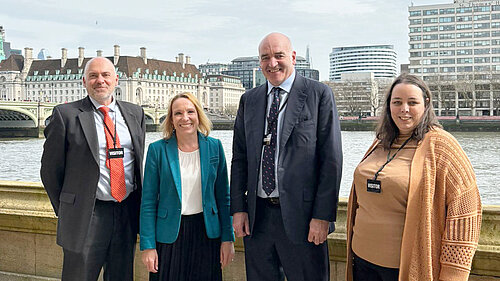Helen and Shropshire businesses meet with DEFRA Minister over ‘thoughtless’ new trade deals

North Shropshire MP Helen Morgan today took the concerns of county businesses directly to the Government in a meeting over the impact of trade deals on two important agricultural industries.
Having already raised the major import and export problems in the House of Commons, Helen invited North Shropshire business owners to Westminster to meet with a Minister from the Department for the Environment, Food and Rural Affairs.
Tullis Matson and Pamela Humphreys of Stallion AI near Whitchurch attended alongside David Mountford, Chief Executive British Equine and Veterinary Association.
Lord Douglas-Miller, Minister for Biosecurity, Animal Health and Welfare, heard their representations about the existential problems the industry is facing due to new red tape over imports. Several stud farms in Shropshire fear losing huge amounts of business because of delays and costs they now face when transporting chilled equine semen.
The MP also made representations on behalf of potato farmers who have found it near-impossible to meet new trading standards, leading to a serious decline in production across the country. This comes after a meeting at Maincrop Potatoes near Knockin earlier in the year.
Helen Morgan described the new trading arrangements as ‘thoughtless and damaging’ to North Shropshire – an area where 93% of land is agricultural and 18% of jobs are in the agricultural sector.
Helen Morgan, Liberal Democrat MP for North Shropshire, said, “The new trading arrangements are both thoughtless and damaging for the agricultural sector. This is a particularly acute problem for those involved in importing and exporting certain goods, with several businesses in North Shropshire being hit hard.
“I was very pleased to secure a meeting with the Minster for Biosecurity, Animal Health and Welfare, in which I raised the cases of several local businesses and brought along members of the team at Stallion AI to make their case.
“We won’t have an agricultural sector left unless there are serious changes made to the way the Government does deals and treats the industry. Ministers need to understand that and change tack before it’s too late for too many rural businesses.”
